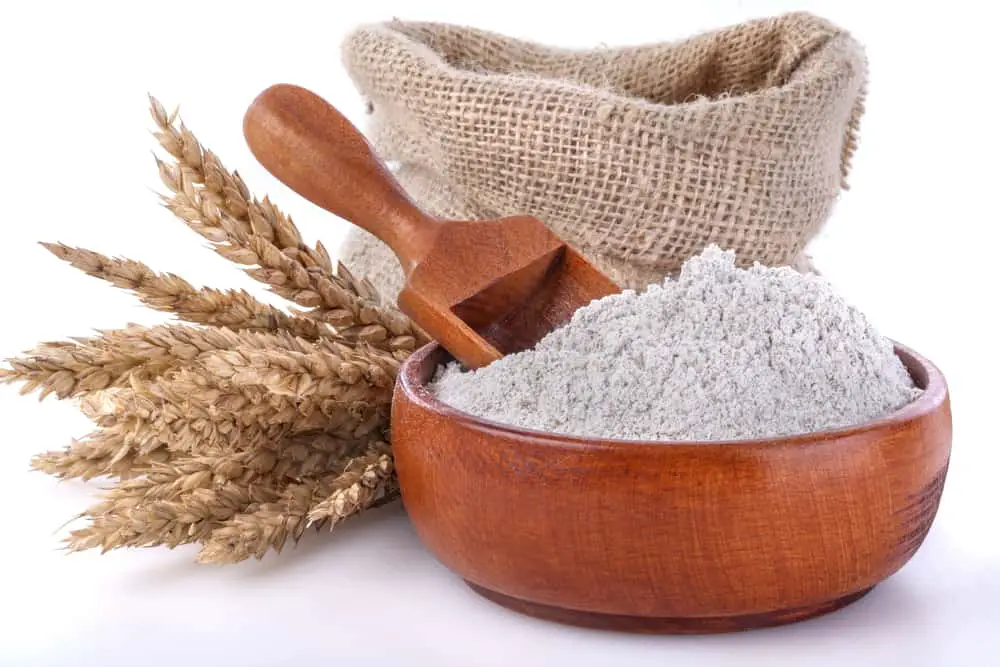What is Einkorn Flour made of?
Einkorn flour is made from an ancient grain that was believed to have been initially grown in the Fertile Crescent more than 10,000 years ago. As an “ancient grain,” einkorn is known as one of the first wheats that humans cultivated for eating. Einkorn is unique with one grain on each stem – and has not been modified over the centuries in an effort to grow more – or least not with most good brands.
Did you know that einkorn is German for “one grain?” That explains a lot!
What is Special about Einkorn Flour?
Einkorn has an unusual history compared to other grains. It’s never been hybridized and only has two sets of chromosomes. For reference, some wheats have been hybridized by both environmental and human influences and now carry up to 42 chromosomes. Einkorn is that much more simple without interference.
Having more chromosomes comes more from companies and farmers cross breeding different types of wheat or seeds. While the result can be very productive and profitable, it’s not always kind to the sensitive human stomach.
Is It Genetically Modified?

Nope! That’s one of the best parts of this flour. A lot of the flour you see on the shelves at the grocery store is the result of generic modification so that wheat grows faster, taller, and more nutritious. There isn’t much research about genetically modified foods to suggest that our bodies were meant to handle them. Einkorn is different!
What Does Einkorn Flour taste like?
Einkorn has a taste not all that different from regular white flour, though it is a bit closer to whole wheat flour. Einkorn tastes a bit naturally sweeter than traditional wheat flour, and offers a slightly nuttier taste.
This flour also doesn’t taste as gritty as most whole wheat flours.
There are other flours out there that taste more significantly different from regular wheat flour than einkorn. Einkorn will be easier to slip into a recipe in case someone has a sensitive palette and notices the difference.
Einkorn Flour Benefits
One of the biggest benefits to ancient grains in flour is the addition of lots of nutritious elements that are often stripped away from traditional wheat based white flours.
With einkorn, you get additional protein, fiber, iron and a host of other vitamins and minerals.
Protein is an essential part of many diets and helps rebuild your body. Einkorn flour typically contains around 4 to 12 grams of protein per serving. This is not a huge amount of protein, but it does come from an unexpected source since many traditional wheat flours offer little to no protein.
Fiber should be a bigger part of most diets. Fiber helps you digest easier and makes your bathroom trips more productive and regular. The amount of fiber in einkorn also helps you feel full faster. Feeling full faster leads to less overeating because humans don’t know they are full until their brain receives the signals that the stomach is filling up. A more dense flour like einkorn can be very helpful for dieters who want to exercise more portion control for a better chance at losing weight.
You’ll also get more iron, which helps rebuild cells and your bones, in addition to more vitamin B6, which is great for your immune system and your brain.
Finally, einkorn is well-known for it’s higher levels of lutein, a powerful antioxidant. Regular wheat contains very little, if any.
Einkorn Flour in Baking

Einkorn can certainly be used in baking, including items like bread, cookies, cakes, and anything else with dough you plan to make.
The flour doesn’t absorb water as much as other flours, like potato flour. You’ll want to either use less liquid when baking with einkorn or use another type of flour in addition to einkorn if you have a liquid heavy recipe or any concerns about water absorption. You also shouldn’t necessarily add more einkorn to make it more absorptive as einkorn doesn’t quite work like that. You could also consider baking bread or bakery items with einkorn for longer to allow for the absorption of more water, but you might risk burning the edges.
While this sounds a bit more complicated, it’s not uncommon for recipes to be written with wheat flour in mind. One suggestion is to look up recipes specific to the type of flour. One nice part about einkorn is that with less water absorption and gluten, einkorn does bake faster breads – it’ll be done quicker and on your counter!
Many people who have tried baked goods from einkorn also report that they have a natural, but not over the top, sweetness. This is great for people with a lower sugar tolerance or blood sugar issues because they require less sugar to make them tasty.
Einkorn can another great advantage when it comes to baked goods. Flour and sugar are normally the parts that release into the bloodstream which cause spikes in blood sugar levels. Einkorn is safer for cookies and sweets because it releases more slowly in the bloodstream, meaning it will be less likely to cause a spike in blood sugar.
Einkorn for Cooking
Einkorn flour is more popularly known for its uses in baking than cooking, but there’s nothing preventing you from adding it to breading for a meat. You could also use einkorn as a thickener.
Be a bit more careful since einkorn doesn’t absorb the liquid as well and experiment with how much you need to achieve the right thickness.
Is Einkorn Flour Easy to Digest?
Einkorn flour is amongst the easiest to digest flours on the market. Einkorn has less gluten and more protein and fiber, making it easy to send through your stomach. This doesn’t necessarily make it friendly to people with celiac disease though, as there is still some gluten present.
Is Einkorn Flour Good for Keto?
There can be a difference between low carb and true keto. Some people on the keto diet who don’t mind a few carbs will find einkorn both satisfying and not disruptive to their diet. Others might find roughly 20 grams of carbs too much. Consider your own diet here.
Is It High in Carbs?
Einkorn flour does indeed have a load of carbs in it, though not as high as typical wheat based flour. Still, the amount of carbs in einkorn flour is relatively low – and well balanced by other nutrition like protein and minerals.
What is Jovial Einkorn Flour?

Jovial is a brand of einkorn flour. This is more to say that Jovial isn’t a subset or a type of einkorn flour, so much as a company well-known for selling high quality einkorn flour.
One of the reasons why Jovial is well known in the world of einkorn is because it’s argued that they saved einkorn. Einkorn was nearly extinct until 2009 until the founders of Jovial discovered the simply purity behind the plant and began locating plants with similar genetic makeup. Some might call Jovial responsible for the larger market of einkorn today due to their efforts in wanting to get non genetically modified einkorn to people’s stomachs.
Is Einkorn Flour Gluten Free?
No, it is not gluten free. Einkorn flour is less likely to induce the same gluten sensitivity as traditional wheat flour, but isn’t considered gluten free.
Is Einkorn the Healthiest Flour?
Well, that depends entirely on what your health needs. If you are seeking a flour high in vitamins, minerals, and proteins, you certainly should try einkorn. If you want a gluten free flour, don’t try einkorn.
As far as actual nutrition goes, einkorn is certainly one of the healthiest with a good balance of the basic building blocks for health, in addition to the potential to lower blood sugar and help you lose some weight.
Can You Substitute Einkorn Flour for All Purpose Flour?
The answer is yes, but not directly. What does that mean? You’ll want to use a different amount of einkorn flour than all purpose flour – and there isn’t really a direct guide to doing so without an einkorn specific recipe. You’ll likely also want to mix einkorn with some other kind of flour like potato flour for any recipes that ask for the absorption of liquid.
Einkorn has some of the same basic properties of all purpose flour though and can be used for all of the same cooking and baking. We actually often suggest using multiple kinds of flour because most recipes are made for all purpose flour. When reading a recipe, check to make sure they are using the same type of flour!
What is a Good Substitute for Einkorn Flour?

There are a few good substitutes for einkorn flour. Included in them are whole wheat flour, which has a similar taste but the ability to absorb more liquid.
You could also consider spelt, which is similar to einkorn. Other options include almond flour and coconut flour.
Does Einkorn Cause Inflammation?
Einkorn flour is unlikely to cause stomach inflammation of people who don’t currently have issues with celiac. Einkorn does have some gluten which is capable of causing an inflammatory reaction in people with more serious sensitivities to gluten.
With a large amount of soluble fiber, einkorn is amongst the best flours to eat for bread. If you have issues with digestion, but still love your bread, einkorn is a great option.
What is Sprouted Einkorn Flour?
Sprouted flour actually applies to nearly all types of flour. Sprouted einkorn results in einkorn becoming a living flour – basically a maturing process.
So what does this do? It gives einkorn more nutritional value. Bonus!
Sprouting is also more simple than it sounds. You don’t exactly have to nurture einkorn seeds to make them sprout. If you are making einkorn flour at home, you could simple put the seeds in a mason jar of water and they’ll start sprouting within a day or so. You’ll just want to let them dry before making them into flour.
How Do I Make Einkorn Flour at Home?
Like fruit and vegetables, the best kind of flour is the freshest.
Einkorn flour is most easily made in a small milling machine at home. These machines grind seeds, millet, or wheat into the fine powder that ultimately makes up flour.
You’ll want to purchase einkorn raw or fresh for the purpose.
How Do I Store Einkorn?
Einkorn has not been processed in a way that makes it store especially long, so without freezing or refrigeration you are looking at between one to three months. If you put it in the freezer or fridge you’ll get a longer storage time.
The flour can be stored in airtight bins to keep oxygen from degrading it’s surface. You’ll also want to store both the seeds and flour in a room temperature and dry place.
Conclusion

We suggest you try this unique flour out. Be a bit more mindful of your recipe – without an einkorn specific recipe, you’ll need to either use a little less einkorn or possibly bake for longer. Either way, einkorn adds some serious nutritional value from a source that isn’t well known for it.
People who bake with einkorn commonly report less stomach discomfort and can readily have more energy since it carries more protein and a better balance of fiber and nutrients. Eaters are also unlikely to notice the differences aside from a slightly nuttier taste.
Enjoy!
